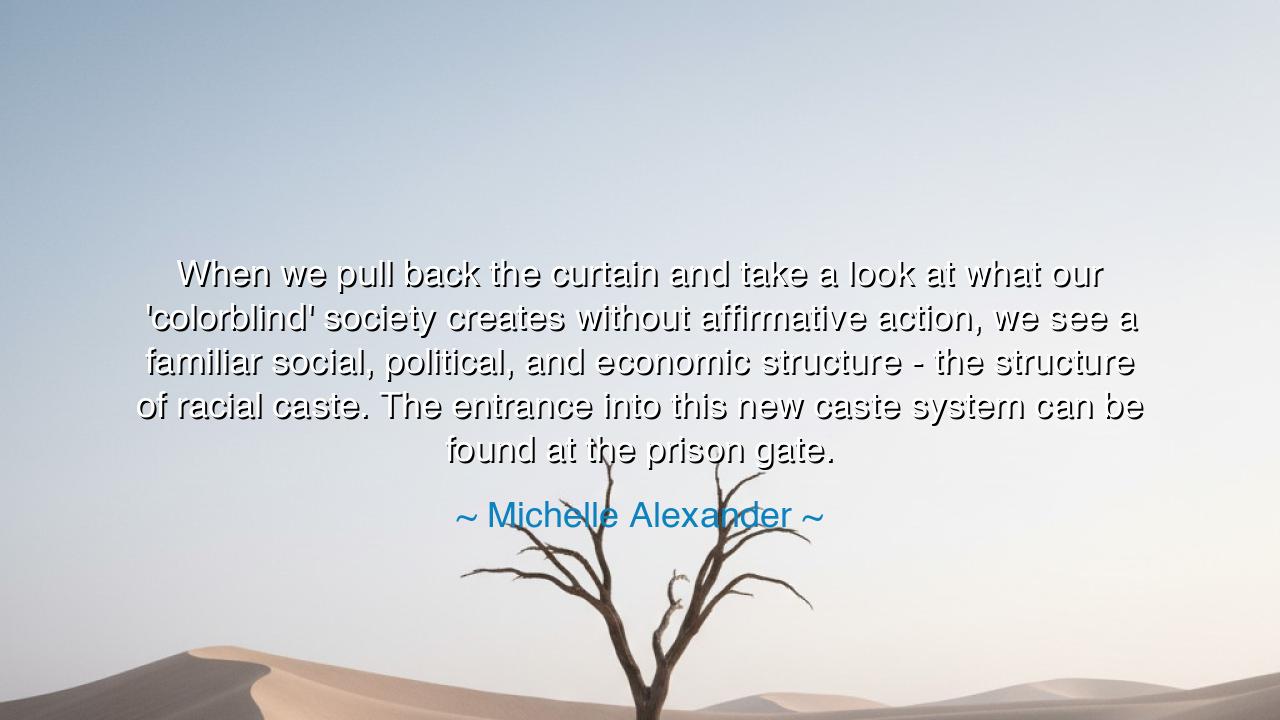
When we pull back the curtain and take a look at what our
When we pull back the curtain and take a look at what our 'colorblind' society creates without affirmative action, we see a familiar social, political, and economic structure - the structure of racial caste. The entrance into this new caste system can be found at the prison gate.






Michelle Alexander, the fierce scholar and author of The New Jim Crow, spoke words that burn with the fire of truth: “When we pull back the curtain and take a look at what our ‘colorblind’ society creates without affirmative action, we see a familiar social, political, and economic structure—the structure of racial caste. The entrance into this new caste system can be found at the prison gate.” These words reveal not merely a critique of policies, but a revelation of hidden chains, the quiet machinery of oppression dressed in the disguise of fairness.
The meaning is piercing. A so-called colorblind society, which pretends to ignore race, often claims virtue by refusing to see difference. Yet in refusing to see, it blinds itself to injustice. Without deliberate correction, without affirmative action, the structures of inequality—built over centuries of slavery, segregation, and discrimination—remain intact. Thus, what emerges is not equality but a new racial caste, where the lines are drawn not only by skin but by imprisonment, poverty, and exclusion. The prison gate becomes the modern-day branding iron, marking millions, particularly men of color, as permanent outsiders.
History testifies to this cycle. After the Civil War, when slavery was abolished, new systems arose—Black Codes, sharecropping, and later Jim Crow laws—that ensured freedom was hollow. Each time one form of bondage was broken, another emerged, clothed in different garments but bearing the same weight. In our own age, the War on Drugs and mass incarceration have become the new Jim Crow, sweeping millions into prisons, stripping them of rights, and branding them as criminals for life. Thus, Alexander unveils the truth: the racial caste has not vanished, it has merely changed its name.
Consider the story of a young man arrested for possession of a small amount of drugs. He is sentenced, serves his time, and returns to the world branded as a felon. He is denied jobs, housing, education, and the right to vote. Though his punishment is said to be complete, the chains remain. This is the hidden structure Alexander speaks of, where the prison gate is not an end but a beginning—an entrance into a caste from which escape is nearly impossible.
The ancient world gives us another reflection. In India, the caste system determined birth, occupation, and fate, binding millions into roles they could not escape. Though different in form, the logic is the same: some are marked as inferior, their opportunities restricted, their humanity diminished, while others enjoy privilege as though it were natural law. Alexander shows us that in America’s “colorblind society,” the same system lives on, rebuilt through policies that claim neutrality but yield the same cruel result.
The lesson for us is urgent and undeniable: do not be deceived by the mask of neutrality. Justice requires not only blindness to race but a clear vision of history, of inequity, of the wounds still bleeding. To build a truly fair society, we must dismantle the structures that perpetuate inequality, even when they cloak themselves in the language of fairness. Equality does not come by accident; it is forged through courage, vigilance, and deliberate choice.
Practical action lies before us. Support reforms that end mass incarceration and restore the rights of those who have served their sentences. Advocate for education, housing, and job opportunities that do not discriminate against the formerly incarcerated. Confront the myths of a “colorblind society” by telling the truth of history and by lifting the voices of those most affected. And in your own life, see those who stand behind the label of “felon” or “criminal” not as castaways, but as human beings deserving of dignity and redemption.
Thus, let Alexander’s words echo like a trumpet in the night: the prison gate is the entrance to a new racial caste, forged by a society that pretends blindness but enforces chains. Do not be silent before such injustice. Pull back the curtain. See clearly. And choose to act, so that future generations will not inherit another age of bondage disguised as order, but a world where justice shines with the light of truth and freedom belongs to all.






AAdministratorAdministrator
Welcome, honored guests. Please leave a comment, we will respond soon